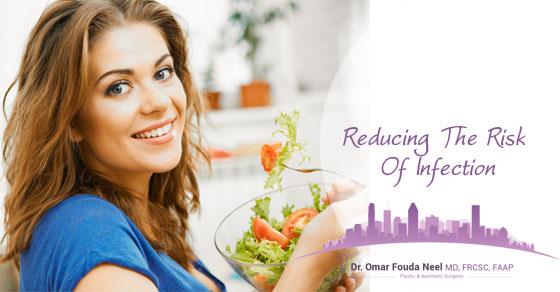What Should I Know About Reducing The Risk Of Infection After Plastic Surgery?
Although the risk of infection after plastic surgery is only about 1 per cent, infection still remains one of the more common complications of plastic surgery. So what can you do to prevent an infection during your recovery process?

What is an infection?
Basically, an infection is an overgrowth of bacteria. When there is a break in the surface of the skin, as that from an incision, this becomes a potential site for bacteria.
Any infection is always of a serious concern because it prevents the incision from healing normally, and this can negatively impact the final result of plastic surgery. An infection could also have other ramifications. In a breast augmentation for instance, an infection could spread from the incision to the implant, in which case the implant has to be removed. In other cases, such as a facelift or a tummy tuck, an infected incision has to be reopened to drain the fluid, and this could result in a more prominent scar.
What are the symptoms of infection?
There are distinct signs that an infection has developed: fever greater than 101.5 F, increased pain, redness or warmth at the incision site, unpleasant odour or discharge coming out of the incision. If you have any of these symptoms, you should call your surgeon as soon as possible.
What is done to prevent the risk of infection?
Any surgery carries a certain risk of infection. However, some people are more liable to infection — patients who suffer from diabetes, for instance, as well as smokers, and those who have certain vascular conditions or who take steroids.
Doctors take great care before and during surgery to make sure there is no possibility of infection. The skin is prepared with antiseptic solution before any incision is made, and aseptic surgical technique is used. Luckily, our bodies’ own defense mechanism destroys most of the bacteria that may get into an incision, and stops any infection from spreading. As well, antibiotics are used to prevent or stop an infection.
You as a patient can also act preventatively to lower the risk of infection:
Eat a healthy diet: Surgery triggers a catabolic state in the body which means that more calories and protein are consumed than in the normal state. Protein and vitamin deficiencies may have a negative effect on wound healing, thus increasing the chance for infection. Make sure your diet includes healthy choices as such fruits, vegetables, and lean protein.
Stop smoking! Patients must stop smoking at least 2 weeks before and 2 weeks after surgery, although it is recommended to quit closer to 4-6 weeks before and after. Smoking prevents wound healing because nicotine causes carbon monoxide inhibition of the red blood cells and vasoconstriction. (This provides a great opportunity to lose this unhealthy habit!)
Keep your incisions and your environment clean, dry and hygienic: It is vital to maintain your recovery environment sterile in order to prevent any bacteria-caused infection. Keep the incisions clean and dry, change your bed sheets often, and adhere to your doctor’s instructions regarding changing bandages.
Take prescribed antibiotics: If your doctor prescribed antibiotics for you to take post-surgery, make sure that you take them, even if you’re feeling fine and there are no signs of infection. While painkillers are optional, antibiotics are not.
Don’t exert yourself: Get as much rest as possible to strengthen your immune defenses. Patients are often keen to return to their regular routines right after surgery, but they should keep in mind that the body needs time to heal. Taking it easy helps to ensure that no strain is being placed on the incisions so they can heal properly, and when they heal quickly and thoroughly, an infection won’t have a chance to develop.














